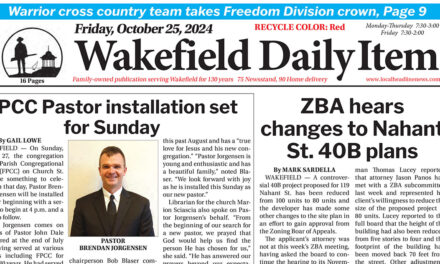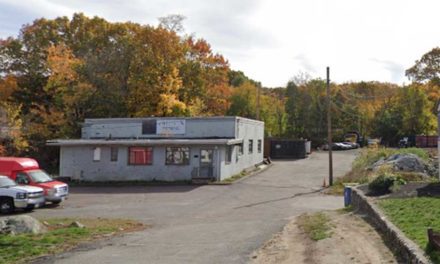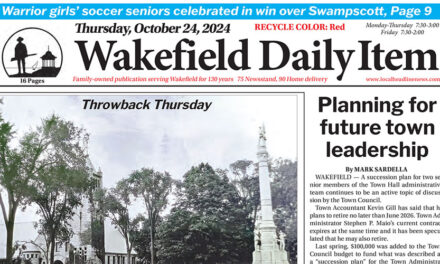Published in the November 7, 2017 edition.
By MARK SARDELLA
WAKEFIELD — Town Meeting voted last night by a wide margin to ban stores from distributing so called single-use, thin film plastic bags to their customers at checkout. The difference between the “yeas” and the “nays” was wide enough that Town Moderator William Carroll did not need to call upon the tellers to count the vote on warrant Article 4.
The affected bags are defined in the proposed bylaw as follows: “Typically with plastic handles, these are bags with a thickness of less than 2.25 mils and are intended for single-use transport of purchased products.” The stated purpose of the bylaw is “to limit the amount of greenhouse gas emissions, preserve the oceans, protect wildlife and reduce the amount of trash that ends up on the streets and in landfills by using recyclable, reusable or compostable bags instead of thin-film, single-use plastic checkout bags.”
Town Administrator Stephen P. Maio began the discussion by reminding those in attendance that last spring Annual Town Meeting voted to refer a proposed plastic bag ban back to the Board of Selectmen for more study. A study committee formed by the selectmen then recommended a modified ban with different standards for thickness and a different schedule of fines for violations.
Selectman Mehreen Butt and Caitlin Bracken (the high school student who initiated the original ban proposal) made a brief presentation in favor of banning the bags, talking about the number of plastic bags used in the U.S. annually and the range of alternatives. They maintained that 55 Massachusetts communities have already banned plastic bags.
Julie Smith-Galvin of Grafton Street said that she supported the ban and saw the ban as “an extension of Wakefield’s revitalization efforts.”
Christine DeFelice of Lawrence Street had the opposite view, saying that she saw the ban as “counter-productive to downtown initiatives” and harmful to local businesses. She maintained that it was another obstacle that the town was forcing businesses to deal with. She maintained that the term “single-use” was a misnomer as most people use the bags multiple times.
Charles McCauley of Lawrence Street questioned the mechanism for determining the width of a plastic bag and said that absent an instrument capable of measuring to one-millionth of an inch, the ban was unenforceable. But a later speaker said the the width of the bags is listed on the box they are shipped in.
Stephen Tripi of Salem Street said that he didn’t buy the argument that banning the bags would improve Wakefield’s litter problem. He said that the bags that he finds in his yard come from stores like Walmart that don’t even have a presence in Wakefield. He insisted that the ban would hurt local businesses and instead the town should focus on enforcing litter laws.
Pat Golini of Bennett Street said he supported the ban, noting that “young people care more about the environment than some people who work for the Item.”
Scot McCauley of Walden Road wanted to know from the study committee how many plastic bags were used in Wakefield annually. When the committee could not provide the answer, he said that the proposed ban was “more of a feel-good thing.” He said that plastic bag use was already dropping due to education and he would prefer to see that effort continue rather than have a legal ban.
Karen Faler of Lowell Street said that there was “a huge problem world-wide with plastics.” She maintained that plastic bags that end up in Lake Quannapowitt “never leave and never dissolve.”
Katie Burbidge of Eaton Street said that it was important to leave the earth better than we found it.
Jennifer Kiley of Sylvan Avenue said that she sees plastic bags on public property near her home. She maintained that people need to change their behavior dramatically and the ban would be a “big first step.”
The plastic bag ban will go into effect for larger stores on July 1, 2018. For smaller retail stores (occupying a finished space of 2,500 square feet or less), the effective date will be Sept. 1, 2018. Extensions (of up to three months) may be granted by the town administrator upon written request.
The new bylaw sets out fines for violators as follows: “The penalty for such violation shall be a written warning for the first offense, a fine of $100 for a second offense and a fine of $200 for the third, and a fine of $300 for a fourth and any subsequent offense.”




